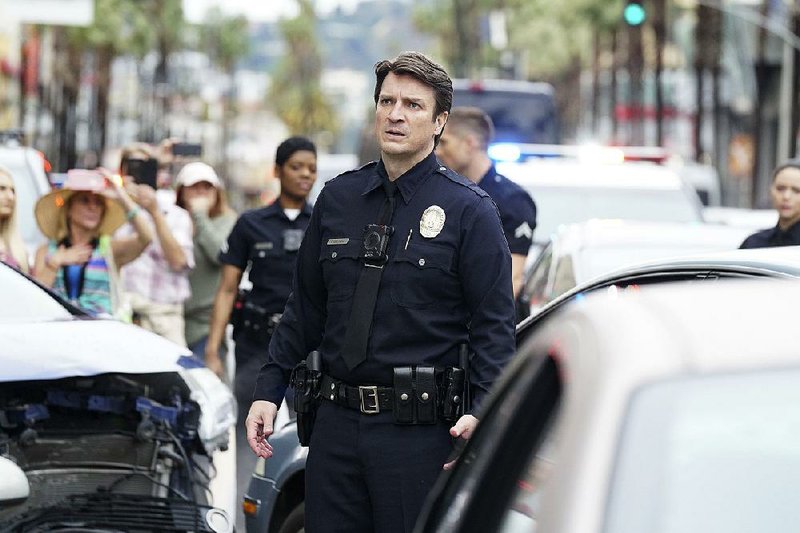In ABC's new show The Rookie, John Nolan, a 40-year-old white Los Angeles Police Department trainee, must prove himself to skeptical higher-ups -- his training officer, a black woman; his sergeant, a black man; and his captain, a Hispanic woman. While the brass try to humiliate him into submission, his natural-born crime-fighting abilities will force his doubters to eat their words: While a terrified black rookie cowers behind a police car, Nolan heroically runs toward gunfire to save his fellow officers, even though it is against protocol.
The Rookie joins other police procedurals that position straight white men as heroic outsiders battling shortsighted women and minorities in leadership roles. In Chicago P.D., Bosch and Training Day, to name a few, white men with a willingness to use off-the-books tactics to protect the city's most vulnerable are discounted by a system hamstrung by "political correctness." Even the comedy Brooklyn 99, highly praised for its diverse casting, started its run with a story line about the charming white detective Jake Peralta locking horns with his uptight superior, Capt. Raymond Holt, a gay black man. Holt must begrudgingly admit Peralta is a gifted detective, even though -- and perhaps because -- he doesn't always stick to the rules.
Opinion
In these shows, "political correctness" and prioritizing diversity are depicted as eroding American institutions and endangering our cities. As Training Day's white protagonist quips, "Political correctness doesn't stop bullets." (CBS canceled Training Day in 2017 after lead actor Bill Paxton died.)
Shows premised on white cops besting diverse higher-ups represent half the crime shows slated for the 2018 season, and they have been some of the most popular. Last season, Chicago P.D. averaged 7 million viewers per episode and claimed the highest ranking among network television for its time slot. An Amazon original, Bosch is ranked among the top 10 most-streamed shows on the site. The Rookie is the most-watched ABC show in its time slot.
The focus on a single heroic officer in a police drama isn't new -- it goes back to the early days of cop shows. But yesterday's fictional cops, in Dragnet, Adam-12 and Columbo, were morally impeccable, unlike today's rule breakers. And today's crop of white, heroic men have new problems: Now they must battle crime and women and minorities in supervisory roles. These higher-ups are so blinded by "political correctness" that they are more concerned with destroying white men's careers than with the safety of the city. They also tend to be out of touch, naive or motivated by personal greed. On Bosch, the black police chief dines in fancy restaurants, has a driver who holds his car door and thinks more about politics than fighting crime.
In this season's premiere of Chicago P.D., a batch of bad heroin is claiming lives all over the city. Cmdr. Hank Voight, head of the intelligence unit, shows up to the scene of a mass overdose only to be stopped by Deputy Superintendent Katherine Brennan. She wants to sideline Voight because he is being investigated for shooting an unarmed suspect. He dismisses her concerns that he did anything wrong and accuses her of trying "to bury an old-school white cop" for the sake of optics. He further argues that keeping him off the case will cost lives. Voight defies her orders and investigates off the books, coercing information from a drug dealer by terrorizing his family.
This ill-begotten information gets the bad dope off the streets, saves the city and forces Brennan to apologize to Voight. Instead of disciplining him for defying her, she praises him for "saving lives" and decides to drop the investigation into the shooting. On these shows, "old-school white cops" have special skills, innate knowledge and bravery that their superiors lack. Investigations into their extrajudicial executions, violent interrogations and bribery are threats -- not only to these men's careers but to the safety of the entire city.
Treating white men as outsiders in police departments run by minorities is at odds with reality. In truth, law enforcement faces a diversity crisis -- especially at the leadership level. According to a 2016 report from the Department of Justice, police forces consistently fail to recruit and retain minorities, which could be contributing to a lack of trust between police and the communities they work in.
In another odd break with reality, cop shows today regularly show police acting violently -- they actually depict civil rights violations in far greater numbers than reported in actual police encounters -- and justifying it. This is a departure from earlier police dramas, which tended to use police violence to show the emotional toll of the job.
Style on 11/20/2018

